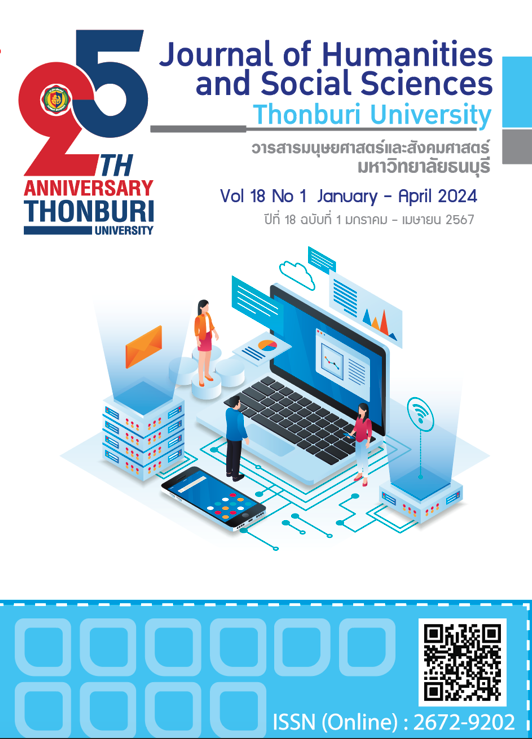อิทธิพลขององค์การแห่งการเรียนรู้ทางการบัญชีที่มีต่อคุณภาพรายงานทางการเงิน ผ่านการประยุกต์ใช้นวัตกรรมทางการบัญชีของผู้ทำบัญชีในเขตกรุงเทพมหานคร
คำสำคัญ:
องค์การแห่งการเรียนรู้ทางการบัญชี, นวัตกรรมทางการบัญชี, คุณภาพรายงานทางการเงินบทคัดย่อ
การวิจัยครั้งนี้มีวัตถุประสงค์เพื่อศึกษา 1) ระดับการเป็นองค์การแห่งการเรียนรู้ทางการบัญชีขององค์การที่ผู้ทำบัญชีปฏิบัติงานอยู่ในปัจจุบัน 2) ระดับการประยุกต์ใช้นวัตกรรมทางการบัญชีของผู้ทำบัญชี 3) ระดับคุณภาพการจัดทำรายงานทางการเงินของผู้ทำบัญชี และ 4) อิทธิพลขององค์การแห่งการเรียนรู้ทางการบัญชีที่มีต่อคุณภาพรายงานทางการเงินโดยมีการประยุกต์ใช้นวัตกรรมทางการบัญชีเป็นตัวแปรส่งผ่าน การวิจัยครั้งนี้เก็บรวบรวมข้อมูลในช่วงเดือนมกราคม – เมษายน พ.ศ. 2566 ด้วยแบบสอบถามออนไลน์จาก ผู้ทำบัญชีในเขตกรุงเทพมหานคร จำนวน 400 คน วิเคราะห์ข้อมูลด้วยสถิติถดถอย
ผลการศึกษาพบว่า ผู้ทำบัญชีมีการปฏิบัติงานอยู่ในองค์การที่การเป็นองค์การแห่งการเรียนรู้ทางการบัญชีอยู่ในระดับสูงมาก
มีการประยุกต์ใช้นวัตกรรมทางการบัญชีอยู่ในระดับสูง และสามารถจัดทำรายงานทางการเงินที่มีคุณภาพอยู่ในระดับสูงมาก นอกจากนี้ผลการศึกษายังพบว่า การประยุกต์ใช้นวัตกรรมทางการบัญชีเป็นตัวแปรส่งผ่านบางส่วนของอิทธิพลที่องค์การแห่งการเรียนรู้ทางการบัญชีมีต่อคุณภาพรายงานทางการเงิน ณ ระดับนัยสำคัญทางสถิติที่ 0.05 ผลการศึกษาในครั้งนี้จะเป็นแนวทางสำหรับองค์การในเปลี่ยนแปลงองค์การสู่การเป็นองค์การแห่งการเรียนรู้ทางการบัญชี และการส่งเสริมให้เกิดการประยุกต์ใช้นวัตกรรมทางการบัญชีในการปฏิบัติงานของผู้ทำบัญชี อันจะนำไปสู่การจัดทำรายงานทางการเงินได้อย่างมีคุณภาพ
เอกสารอ้างอิง
จักรกฤศฏิ์ พาราพันธกุล. (2562). สารจากนายกสภาวิชาชีพบัญชี. รายงานประจำปี 2562. กรุงเทพฯ: สภาวิชาชีพบัญชีในพระบรมราชูปถัมภ์.
ฉัตรรัชดา วิโรจน์รัตน์. (2561). โมเดลความสัมพันธ์เชิงสาเหตุของการประยุกต์ใช้นวัตกรรมและเทคโนโลยีปฏิบัติงานบัญชีสมัยใหม่, การพัฒนาความรู้ต่อเนื่องทางวิชาชีพบัญชี, ความเชี่ยวชาญทางการบัญชี อย่างมืออาชีพที่มีต่อประสิทธิภาพรายงานทางการเงินของนักบัญชีในประเทศไทย. วารสารวิทยาการจัดการสมัยใหม่, 11(1), 17-34
ณัฐชนน น้านิรัติศัย. (2562). ปัจจัยที่มีอิทธิพลต่อคุณภาพรายงานทางการเงินตามมาตรฐานการรายงานทางการเงินสำหรับกิจการไม่มีส่วนได้เสียสาธารณะของวิสาหกิจขนาดกลางและขนาดย่อมในเขตพัฒนาพิเศษเฉพาะกิจ. บัญชีมหาบัณฑิต, มหาวิทยาลัยสงขลานครินทร์
นิภาภัทร แสนอุบล. (2562). อิทธิพลของนวัตกรรมการบัญชีและความได้เปรียบเชิงธุรกิจที่มีต่อการตัดสินใจลงทุนของนักลงทุนในบริษัทจดทะเบียนในตลาดหลักทรัพย์แห่งประเทศไทย. วารสารบริหารศาสตร์ มหาวิทยาลัยอุบลราชธานี, 8(16), 52 – 70.
ประกาศสภาวิชาชีพบัญชีที่ 48/2563 เรื่อง กรอบแนวคิดสำหรับการรายงานทางการเงิน. (2563, 17 พฤศจิกายน). ราชกิจจานุเบกษา. เล่ม 137 ตอนพิเศษ 271 ง. หน้า 14.
ราชิต ไชยรัตน์. (2563). บทบาทนักบัญชีในโลกอนาคตจากนักบัญชีสู่นักบัญชีนวัตกร. สภาวิชาชีพบัญชี ในพระบรมราชูปถัมภ์. สืบค้นเมื่อวันที่ 25 พฤศจิกายน 2565, จาก https://www.tfac.or.th/Article/Detail/126212
สมชาย เลิศภิรมย์สุข. (2555). แนวทางการพัฒนาองค์กรแห่งการเรียนรู้ของวิชาชีพบัญชีในประเทศไทย. การจัดการดุษฎีบัณฑิต, มหาวิทยาลัยราชภัฏสวนดุสิต.
สรารีย์ จิรังดา. (2563). การพัฒนานวัตกรรมทางการบัญชีของธุรกิจขนาดกลางและขนาดย่อม (SMEs). บริหารธุรกิจมหาบัณฑิต, มหาวิทยาลัยเทคโนโลยีราชมงคลพระนคร.
Ankrah, E., Mensah, C. C. Y. & Ofori-Atta, L. (2015). The Relevance of Accounting Information in the Management of Small Scale Businesses in the Yilo Krobo District in Ghana. European Journal of Business and Management, 7(8), 181-189.
Briers, M., & Chua, W. F. (2001). The role of actor-networks and boundary objects in management accounting change: a field study of an implementation of activity-based costing. Accounting, Organizations and Society, 26, 237-26.
Chenhall, R. H. (2008). Accounting for the horizontal organization: A review essay. Accounting, Organizations and Society, 33(4-5), 517-550.
Dachi, A. I., Erlina, & Bukit, R. B (2019). Analysis of factor affecting the quality of financial statements using information technology as moderated variables in the government of the South Nias Regency. Journal of Public Budgeting, Accounting and Finance, 2(3), 1-13.
Deshmukh, A. (2006). A Framework for Digital Accounting.In Potter, M. (Ed.). Digital Accounting: The Effects of the Internet and ERP on Accounting. United Kingdom: IRM Press:Idea Group Inc
Hoffman, C., & Rodriguez, M. M. (2013). Digitizing Financial Reports –Issues and Insights: A Viewpoint. The International Journal of Digital Accounting Research, 13(6), 73–98.
Intuit. (2019). Report-Future of the Accounting Profession. Retrieved January 20, 2023, from https://www.thaiaccounting.com/single-post/2017/01/23/Intuit-2020-Report--Futureof-the-Accounting- Profession
Krejcie, R. V. & Morgan, D. W. (1970). Determining Sample Size for Research Activities. Educational and Psychological Measurement. 30(3), 607-610.
Nunnally, J. C. (1978). Phychometric Theory. 2nded. New York: McGraw-Hill.
Rovinelli, R. J., & Hambleteton, R. K. (1977). On the use of Content Specialists in the Assessment of Criterion-Referenced Test Item Validity. Dutch Journal of Educational Research. 2, 49-60.
Translated Thai References
Parapuntakul, C. (2019). Letter from the Chairman of Federation of Accounting Professions. TFAC Annual report 2019. Bangkok: Federation of Accounting Professions (in Thai)
Wirotrat, C. (2018). A Causal Relationship Model of Adaption Innovation and Modern Technology Accounting Practices, Continuing Professional Accounting Development, Professional Accounting Expertise on Performance Financial Report of Accountant in Thailand. Journal of Modern Management Science, 11(1), 17-34. (in Thai)
Naniruttusai, N. (2019). Factor Affecting the Quality of Financial Reporting According to the Thai Financial Reporting Standards for Non-Publicly Accountable Entities of SMEs: Special Development Zone. Master of Accountancy, Prince of Songkhla University. (in Thai)
Saenubon, N. (2019). Influences of Accounting Innovation and Competitive Advantage on Investors’ Decision of Listed Companies in Thailand. Journal of Management Science, Ubon Ratchathani University, 8(16), 52 – 70. (in Thai)
Announcement of the Federation of Accounting Professions No. 48/2020 on Conceptual Framework for Financial Reporting. (2020, 17 November). Royal Gazette. Volume 137, special section 271 D., page 14. (in Thai)
Chairat, R. (2020). The role of accountants in the future world from accountant to accountant innovator. Federation of Accounting Professions. Retrieved November 25, 2023, from https://www.thaiaccounting.com/single-post/2017/01/23/Intuit-2020-Report--Futureof-the-Accounting-Profession. (in Thai)
Lertpiromsuk, S. (2012). An Approach to Development of Learning Organization for Accounting Profession in Thailand. Doctoral of Management, Suan Dusit Rajabhat University. (in Thai)
Jirungda, S. (2020). Accounting Innovation Development of Small and Medium Enterprises. Master of Business Administration, Rajamangala University of Technology Phra Nakhon. (in Thai)
ดาวน์โหลด
เผยแพร่แล้ว
รูปแบบการอ้างอิง
ฉบับ
ประเภทบทความ
สัญญาอนุญาต
ลิขสิทธิ์ (c) 2023 Sukmongkol Lertpiromsuk, Suna Sudhikiat, Orasa Aramrattana, Preyanuch Kijrungrojjarean

อนุญาตภายใต้เงื่อนไข Creative Commons Attribution-NonCommercial-NoDerivatives 4.0 International License.
ผลงานที่ปรากฎในวารสารฉบับนี้เป็นลิขสิทธิ์เฉพาะส่วนบุคคลของผู้เขียนซึ่งต้องรับผิดชอบต่อผลทาง กฎหมายที่อาจเกิดขึ้นได้และไม่มีผลต่อกองบรรณาธิการ






